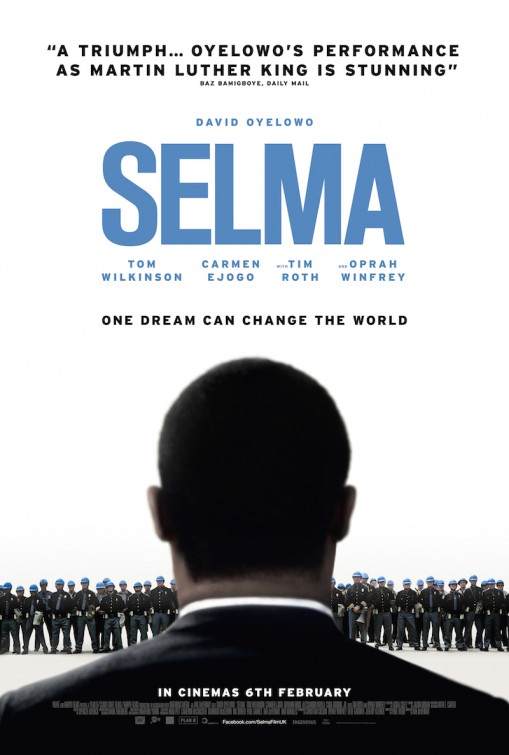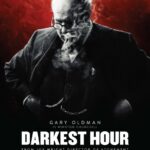One Dream Can Change The World
Director
Ava DuVernay
Starring
David Oyelowo
Carmen Ejogo
Tom Wilkinson
The opening scenes of Selma immediately set the tone for the state of America. The Civil Rights Movement is in full swing across the United States, causing backlash and retaliation in several forms. Martin Luther King [Oyelowo] receives the Nobel Peace Prize, children are killed in a racially motivated bombing of a church, Annie Lee Cooper (Oprah Winfrey playing an oppressed citizen of Selma) fills out the forms and jumps through the hoops to register to vote, only to be denied by the registrar. Hearing of the treatment of those in Selma, King and members of the Southern Christian Leadership Conference travel to the small Alabama city to hold peaceful, non-violent protests. Everyone involved is mistreated by the local law enforcement and tensions grow between the Governor of Alabama [Tim Roth] and President [Wilkinson], who wants to keep the public eyes off the voting rights and on his own promoted policies.
All too often, message pieces are weighed down and trapped by the principles they are trying to convey. The dialogue comes off as stilted and unnatural, the morals are diminished to finger pointing lectures and the infallible characters are simply alien and unrelatable. Thankfully, Selma side-steps all of these pitfalls and demonstrates that one can portray a powerful and important segment of history without romanticising the events or elevating those involved to an unrealistic saintly level. In other words, Selma is an approachable look at a key point in the evolution of tolerance in the United States, whilst reminding audiences that inequality still runs rampant today. At the forefront of this release is a wealth of immensely talented individuals delivering energetic and gripping performances. Admittedly, wanting to be associated with a film about equality, several prolific actors and cameos come out of the woodwork to such a degree that their presence really takes you out of the moment. Oyelowo gives a wonderful and very human performance but partly lacks the charm and charisma of his real-life counterpart causing him to blend in with the crowd somewhat, rather than standout from it. To me, some of the really standout roles belong to Carmen Ejogo as King’s wife Coretta, who fully supports the cause but sees her family being lost and consumed by it, Wendell Pierce as activist Hosea Williams and Andre Holland as the impressionable a young Andrew Young. Equally, Tim Roth gives a superbly malicious and despicably credible turn as the southern Governor Wallace, who remains fervently against desegregation.
Though his career is still blooming, Bradford Young’s cinematographic penchant for shadow and interiors lit solely by available light is beautifully presented here. Combined with DuVernay’s direction, the film swells visually with vibrancy and life without resorting to many of the clichéd elements that period dramas usually elicit. The production value is equally high, adding several aesthetic layers to the already detailed finished piece. The only technical area that seems to falter somewhat is the musical score. It’s not that there’s anything outwardly offensive or displeasing about it but it lacks any real weight and gravitas outside of the typical melodic style utilised in made-for-TV dramas; which is a great shame considering those involved. The pacing is also worth a note, flowing neatly for two solid hours without draining or overwhelming the audience – aided by the script’s sparse moments of levity amidst the anguish.
While I believe there is an artistic reasonability to accurately represent history, cinema is first and foremost a storytelling medium and if we get too bogged down in the minute facts and details of events and portrayals, we end up with a very bland depiction of what should be a rousing representation. Those with first-hand experience seem to be praising the film’s accuracy while condemning the portrayed actions and conduct of President Johnson. Personally, I think the scripts’ handling of Johnson’s struggles with racial bigotry in the government and the slow-moving political system is more than adequate without damaging the legacy or reputation of the man himself. In truth, the key talking points should be focused more on things like changes to the law that were actioned and largely ignored by the disillusioned individuals in charge. The fact that the black populace already have the vote at the start of the film but are kept out of the registration booths because they cannot apply to vote without a registered voter personally vouching for them. And with the registered voters being white the likelihood of getting anyone on the electoral system is minimal. The fact that national change was put into law and openly ignored is more important than whether or not the President did or didn’t argue with Martin Luther King down a phone.
Events you would assume are important, such as Malcolm X’s involvement and subsequent assassination were rather hurriedly gleaned but this only serves to remind us that Selma isn’t a movie about one man, the issue is so much bigger than that; hence the title. But by focusing on an important segmented turning point, we are able to fill in the gaps and glimpse the personality of the man at the head of the movement.
Release Date:
6th February 2015
The Scene To Look Out For:
A film of this nature is all about powerful scenes – it has to be in order to convey the importance of what is being said. One of the most shocking moments comes right at the start of the film. A small group of children are descending a staircase in their Sunday best, discussing various trivialities that children innocently preoccupy themselves with. Without warning an explosion rips through the wall killing everyone on-screen, sending a shockwave across the country. Brutal acts, brutally illustrated are the backbone of any film about the civil rights movement and this particular example sets the tone and urgency for change that echoes throughout the film.
Notable Characters:
More often than not, the standout performances in films focusing on inequality are the villainous characters. Not because they are better or worse than the inspirational roles but because they stir such a deep and passionate hatred in our system – which is an extreme (if odd) compliment to pay any actor. As such, Tim Roth’s calculating and vicious delivery of frankly abhorrent dialogue makes ones skin crawl and sets him aside as a chilling example of the abuse of power in line with a questionable moral compass.
Highlighted Quote:
“If Jesus Christ himself and Elvis Presley both came to him together and told him to go easy on the negroes, he would beat the shit out of the two of them and throw them in jail”
In A Few Words:
“Refreshingly different portrayal of the US civil rights movements that neatly tiptoes through a minefield of cliché to produce something thought provoking and impressive”
Total Score: 4/5
![The Red Right Hand Movie Reviews [Matthew Stogdon]](https://reviews.theredrighthand.co.uk/wp-content/uploads/2021/12/cropped-header1.png)




